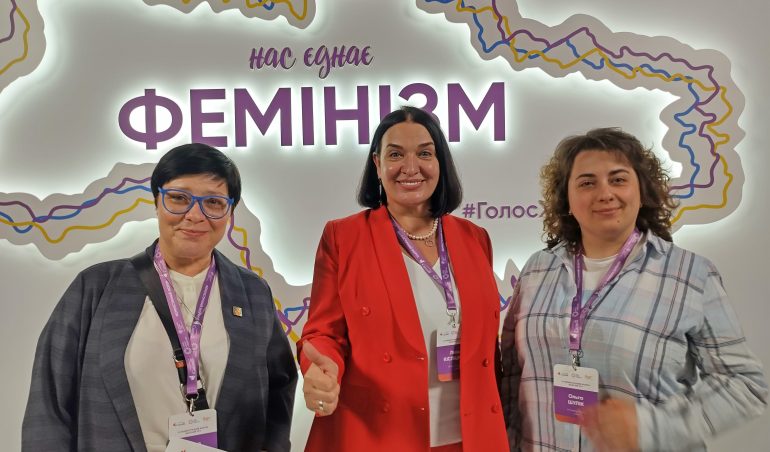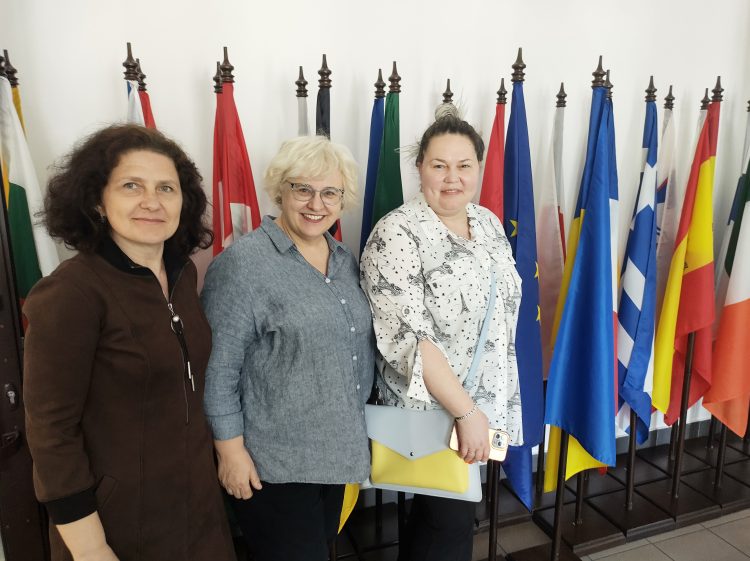UN Security Council Resolution on Women Peace and Security 1325 twenty-five years on. What does it mean for Ukraine?
May 02, 2024
The groundbreaking United Nations Security Council (UNSC) Resolution Women, Peace and Security 1325 will be 25 years old next year.
Acknowledging for the first time the key role of women in peace-making in conflict prevention and that conflict-related sexual violence should be prevented and addressed, following the adoption of UNSC 1325, many countries acted on a related National Action Plan, including Ukraine.
The EU Advisory Mission (EUAM) Ukraine supports the Ukrainian Government and Civil Society Organisations (CSOs) in their efforts to translate the resolution and the National Action Plan into practice. The Mission contributes to the enhancement of the visibility and the role of women as important actors in safety and security, both in law enforcement and as citizens.

To better understand what this means in practice, some of the Mission’s partners who work on the resolution in their daily activities at the level of Regions and Communities share about their views and experiences.
Olha Shulik, coordinator of the so-called Localisation Coalition 1325 for Dnipropetrovsk Region, states that translating the UNSC 1325 into a National Action Plan means for this to be meaningful at the level of regions (oblasts) and communities (hromadas). “Ukrainian authorities have tasked each region to make a regional action plan”, explains Olha, adding that in Dnipro, like in other regions, the Coalition were set as “an initiative of mainly women’s organisations who see the need to look at safety and security though the eyes of both women and men”. Olha adds that the participants in the Coalition address issues related to safety and security concerns for the people, possible different approaches between women and men and how to contribute to good relations between people, maintaining peaceful relations even at time of war. This takes place with limited capacity and funds. The Coalition, continues Olha, builds connections between different relevant groups, for example CSOs, especially women’s organisations, the National Police of Ukraine (NPU), the Patrol Police, the Security Service of Ukraine (SSU), local authorities and the Regional Prosecutors’ Office. An example is the setting up of a Working Group at the Dnipro Regional State Administration on Conflict Related Sexual Violence also involving police and Civil Society Organisations (CSOs). Olha also details on the involvement of the Regional Prosecutors’ Office in training activities where Gender-Based Violence and Trafficking are addressed. This way the Coalition adds to progress on coordinating between different relevant actors which results in better services for the people.
Liliya Kislitsyna works on the Localisation 1325 Coalition in the Donetsk Region, where Safety and Security audits1 with local government and CSOs have been conducted. Her work involves discussing with people on their most pressing safety and security concerns. Part of the Donetsk region is under occupation. “We now have local action plans for the non-occupied and de-occupied areas” explains Liliya, adding that at community level in Kramatorsk the Coalition made sure all kindergartens have shelters and all teachers have security trainings. Having assessed that the Donetsk Conflict-Related Sexual Violence survivors needed more medical support, and because the larger Survivors’ Relief Centres were too far for most women, a gynaecological clinic was opened, she explains. “As many of our Donetsk citizens are Internally Displaced Persons (IDPs), we also help with humanitarian action.
Liliya mentions how Localisation Coalitions on Women, Peace and Security 1325 (now working in 19 regions) learn from each other. Olha adds that the Kherson Localisation Coalition has shared information about their work with the Patrol Police and the NPU on combating trafficking. Others are likely to be inspired by that work, not least because trafficking and labour exploitation are on the rise in other areas, for example in Dnipropetrovsk.
As the director of the Women Information Consultative Centre (WICC), Anastasiya Nenka is part of the Localisation Coalitions’ coordinators and has facilitated many training activities, including at inter-regional level.
Anastasiya adds that sometimes the cooperation between the local authorities and the CSOs can be challenging. “Localisation means that you have to make a plan that reflects the local needs and priorities, it is an opportunity to be close to what is the most important for the people in your region. This is how the National Action Plan comes alive; it has to be meaningful for the people and result in something very practical” concludes Anastasiya.
Depending on their possibilities and priorities, Local Coalitions deal with different issues. Some regions, like Khmelnitsky, have a very systematic approach, others have highly active communities focusing on a hands-on approach to improve safety and security.
Olha, Liliya and Anastasiya express their appreciation for EUAM-Ukraine’s commitment towards working with the Coalitions, whose joint efforts contribute to the safety and security of all citizens of Ukraine.
The Localisation Coalitions 1325 on Women, Peace and Security show that the original United Nations Security Council resolution from the year 2000, is still bearing fruit. The local approach means that the needs and priorities of all Ukrainian citizens can be taken into account and take center-stage. Peace and Security are crucial topics for women and men, at international, national and at local level.


